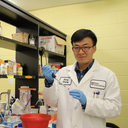Effect of crocetin on blood pressure restoration and synthesis of inflammatory mediators in heart after hemorrhagic shock in anesthetized rats.
Raktažodžiai
Santrauka
Crocetin, a constituent of saffron, has been shown not only to prevent reactive oxygen species-induced hepatotoxicity and genotoxicity but also to increase whole-body oxygen consumption and survival. The present study was to determine whether crocetin has beneficial effects on cardiac injury caused by hemorrhagic shock and resuscitation in rats. Anesthetized rats were bled to reduce mean arterial pressure (MAP) to 35 +/- 5 mmHg for 60 min and then resuscitated with their withdrawn shed blood and isotonic sodium chloride solution. Crocetin was administered via the duodenum at 50 mg/kg 40 min after bleeding. We investigated MAP, serum creatine kinase activity, the activity of nuclear factor-kappaB, iNOS, and total superoxide dismutase (T-SOD), as well as levels of NO, malondialdehyde, TNF-alpha, and IL-6 in the heart at 2 h postresuscitation. Compared with control group, crocetin significantly increased MAP from 10 min after administration to the end of the protocol except the period between 75 and 90 min after initial bleeding, whereas serum creatine kinase activity was dramatically decreased at 2 h postresuscitation. Myocardial nuclear factor-kappaB activity, iNOS activity, NO, malondialdehyde, TNF-alpha, and IL-6 were significantly elevated, whereas T-SOD activity was suppressed in the control group if compared with those of sham animals. These parameters tended to be normalized in rats administered crocetin. These results suggest that crocetin blocks inflammatory cascades by inhibiting reactive oxygen species production and preserving T-SOD activity to ameliorate the cardiac injury caused by hemorrhage/resuscitation.


